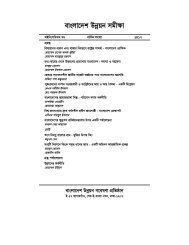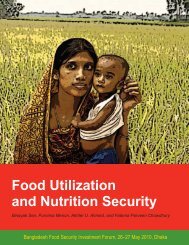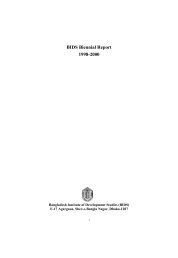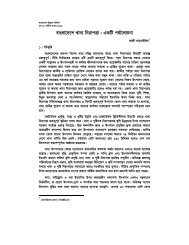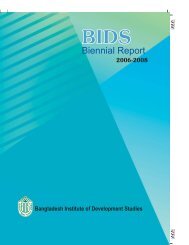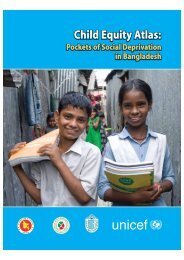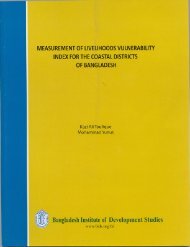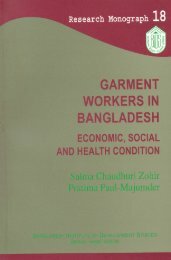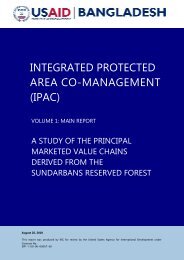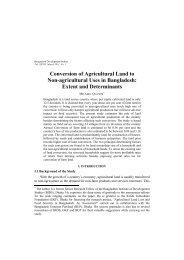2009-2010 - BIDS
2009-2010 - BIDS
2009-2010 - BIDS
You also want an ePaper? Increase the reach of your titles
YUMPU automatically turns print PDFs into web optimized ePapers that Google loves.
Networking and Expanding Outreach<br />
The principal aim of networking and<br />
expanding outreach is to encourage<br />
institutional collaboration, engage in<br />
research on themes of relevance, and facilitate<br />
the exchange of knowledge and expertise<br />
between the institutions. The <strong>BIDS</strong> is also<br />
engaged in intellectual partnerships with leading<br />
international institutions to support quality<br />
research and impact evaluations. The emphasis<br />
is on mutual development of capacity, address<br />
the knowledge gaps, and gather evidence on<br />
what works, when, why, and how much toward<br />
improving the lives of the poor people. Under its<br />
networking and outreach strategy, <strong>BIDS</strong> is actively<br />
engaged in promoting the exchange of ideas<br />
and cooperation for collaborative research and<br />
facilitating knowledge sharing among researchers<br />
and policymakers.<br />
A major vehicle of expanding outreach is to<br />
organize <strong>BIDS</strong> dialogues involving policymakers,<br />
researchers, policy analysts, academicians, and<br />
other stakeholders which essentially provide a<br />
platform for stimulating evidence-based policy<br />
debates on issues of interest so as to bring<br />
about greater clarity around the concepts and<br />
the solutions. These platforms are also used to<br />
stimulate discussion and engage in the widest<br />
possible dissemination of <strong>BIDS</strong> research outcomes<br />
and findings from specific studies.<br />
understand the complexities of the challenges<br />
faced by South Asia to mitigating poverty and<br />
promoting inclusive development.<br />
The SANEI comprises of member institutes based<br />
in the countries of South Asia (Bangladesh, India,<br />
Nepal, Pakistan and Sri Lanka). Recently, initiatives<br />
have been taken to expand the SANEI network to<br />
remaining SAARC countries (Afghanistan, Bhutan,<br />
and Maldives). SANEI has a membership of 55<br />
research institutes in the South Asia region. There<br />
are 12 research institutes from Bangladesh, 25 from<br />
India, 3 from Nepal, 10 from Pakistan and 5 from Sri<br />
Lanka. The Network encourages relevant research<br />
institutes of the region to become member of<br />
SANEI.<br />
The principal driving force behind SANEI is its<br />
Steering Committee (SC) which acts as a conduit<br />
for disseminating information about the Network.<br />
The Research Advisory Panel (RAP) comprising<br />
four internationally renowned economists from<br />
South Asia evaluates research proposals submitted<br />
from the network of institutions. The panel reviews<br />
the progress of the projects and provides expert<br />
guidance with the objective to improving the<br />
quality of research.<br />
The South Asia Network of Economic Research<br />
Institutes (SANEI)<br />
Since October <strong>2009</strong>, the Secretariat of the South<br />
Asia Network of Economic Research Institutes<br />
(SANEI) has been located at <strong>BIDS</strong>. The SANEI is a<br />
regional initiative to foster networking amongst<br />
economic research institutions in South Asia. The<br />
aim of the Network is to establish strong research<br />
interlinkages among diverse economic research<br />
institutes in the South Asian region.<br />
The SANEI is the Global Development Network’s<br />
Regional Network Partner for the South Asia region.<br />
As the Network Partner of Global Development<br />
Network (GDN), SANEI works to ensure the<br />
generation of research by those best placed to<br />
<strong>BIDS</strong> Biennial Report <strong>2009</strong>-<strong>2010</strong> 45



